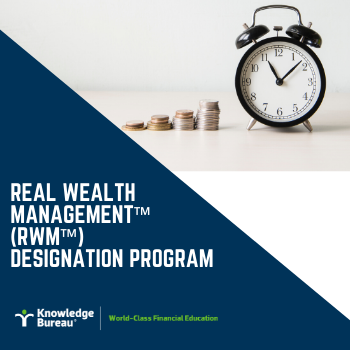Seven Financial Conversations to Initiate During the Pandemic

Evelyn Jacks
Your clients will likely need your guidance on the tax and financial consequences of life and economic events brought on by the coronovirus. Following is a checklist of financial issues for you to discuss with them.
1. Filing tax remittances and returns. President Trump has announced that tax filers affected by the coronavirus will get extra time to pay their taxes this year. This extension did not come with a new remittance date.
In Canada, we can expect similar announcements if the pandemic worsens here, and affects taxpayers’ abilities to meet their tax filing and remittance obligations. However, it’s prudent to be proactive and call clients now to make appointments and speed up the tax filing process if they are ready to file; first, to get their refund money into bank accounts as quickly as possible and second, to set aside money to pay amounts owing by April 30. As markets continue to be volatile, taxpayers may have to dip into savings to pay for their tax bill. Doing so with as much time as possible, to consider which accounts and investments to tap into could help to mitigate withdrawal pain.
2. Have cash on hand. As Canadians face increasing economic consequences due to the pandemic, including a quarantine, temporary job loss and loss of revenue by small businesses hanging on through the crisis, it’s important to advise your clients to have some cash on hand. Should trips to the bank become impossible for a variety of reasons, that’s prudent advice. Help your clients understand how much is appropriate and where to draw the money from.
3. Making investment decisions during a pandemic. Should you buy or should you sell? It’s the question your clients are probably struggling with and particularly if you are a new advisor, it’s one you need to be prepared to answer with confidence. That answer lies largely in your ability to fall back on the long-term tax and financial planning you have done to date with your clients. Fidelity International has a good report on what has happened in the past to stock market returns during and after pandemics; your firm may have other important research to share.
The conclusion is that we don’t know what the future will hold at this time - markets don’t like uncertainty - and that’s where a long-term strategy and a multi-stakeholder relationship with knowledgeable advisors can really pay off. In the absence of such a Real Wealth Management ™ approach, as taught in all the professional courses Knowledge Bureau presents, financial disasters can happen. This is illustrated below.
4. File tax returns even if you incur losses. A recent court case spelled bad news for a day trader, who decided not to file a tax return because he had only capital losses to report. It is a  taxpayer’s obligation to file a tax return every year to report capital gains and losses and also of great advantage if you do so: those losses can be carried back three years to offset capital gains or carried forward indefinitely to offset gains in the future. It’s such a bad move to miss this important tax planning opportunity and your clients need to understand concept.
taxpayer’s obligation to file a tax return every year to report capital gains and losses and also of great advantage if you do so: those losses can be carried back three years to offset capital gains or carried forward indefinitely to offset gains in the future. It’s such a bad move to miss this important tax planning opportunity and your clients need to understand concept.
You can help them catch up on misses like this now by going back up to 10 years to 2010 to recover missed capital losses or file prior years’ returns. In addition, low income earners qualify for a host of refundable tax credits, depending on family composition, and should take advantage of the tax system’s generosity in just such instances.
This taxpayer’s situation spiralled into crisis as his failure to file a return triggered an expensive audit in which CRA reassessed the taxpayer for millions based on the dispositions reported by the brokerage house. Neither the brokerage house nor the CRA went to the trouble to calculate the true ACB (Adjust Cost Bases) values of the trades. CRA simply assessed acquisition costs at zero and demanded tax on the increase in value from there.
How a tax department can consider this audit approach to be valid and reasonable in demanding millions in taxes, interest and penalties that were essentially not owing is a big concern. But the bottom line is this: the onus of proof is on the taxpayer to verify these cost bases with their investment firm and then push back the right information to CRA with qualified professional tax accountant to minimize significant costs and stress.
5. Adding professional value in difficult times. Investment firms dedicated to high service standards can help clients avoid dire consequences like those above by proactively providing the informational avenues to the details taxpayers need to calculate their investment transactions, and this is more than just pointing people to websites. Professionals will enable and execute on these solutions for their clients. Tax specialists who can use this pandemic opportunity to share tax and financial literacy with their clients and invite them into meetings to learn more about their obligations.
6. Documentation: Go digital but assemble important legal matters for retrieval . Most financial transactions can occur online today so it should not be a problem for your clients to continue meeting their financial obligations during the pandemic. They simply may need some guidance if that is new to them. However, in addition, should banks close, or the internet be in any way affected by future events, or powers of attorney need to be invoked on behalf of sick and dying clients, it’s prudent to be ready.
Be sure your clients store balances in various banking, credit card and investment accounts, together with instructions to their trusted individuals who many need to act on their behalf and keep those documents in a safe place. Now is also a good time to prepare wills, health care directives and powers of attorney. Help your clients get organized to do so and get it done.
7. Assist in Maximizing EI, health insurance coverage. Your business clients may wish to understand how EI and group insurance coverage and costs will be affected by the pandemic, as well as how to best communicate the options available under these plans should employees become ill. You may wish to schedule some time with your clients and insurance providers together for this reason or arrange for a conference call. Then know the red tape pathways: offer to help your clients with applications to tap into the various options.
We find ourselves in an environment that is changing so rapidly from hour to hour that deep professional relationships matter more now than ever. It’s time to be there for one another and do the right things to weather this significant storm. Stay safe and healthy in the meantime.
Evelyn Jacks is Founder and President of Knowledge Bureau. Follow her on twitter @evelynjacks.
COPYRIGHT OWNED BY KNOWLEDGE BUREAU INC., 2020.
UNAUTHORIZED REPRODUCTION, IN WHOLE OR IN PART, IS PROHIBITED.